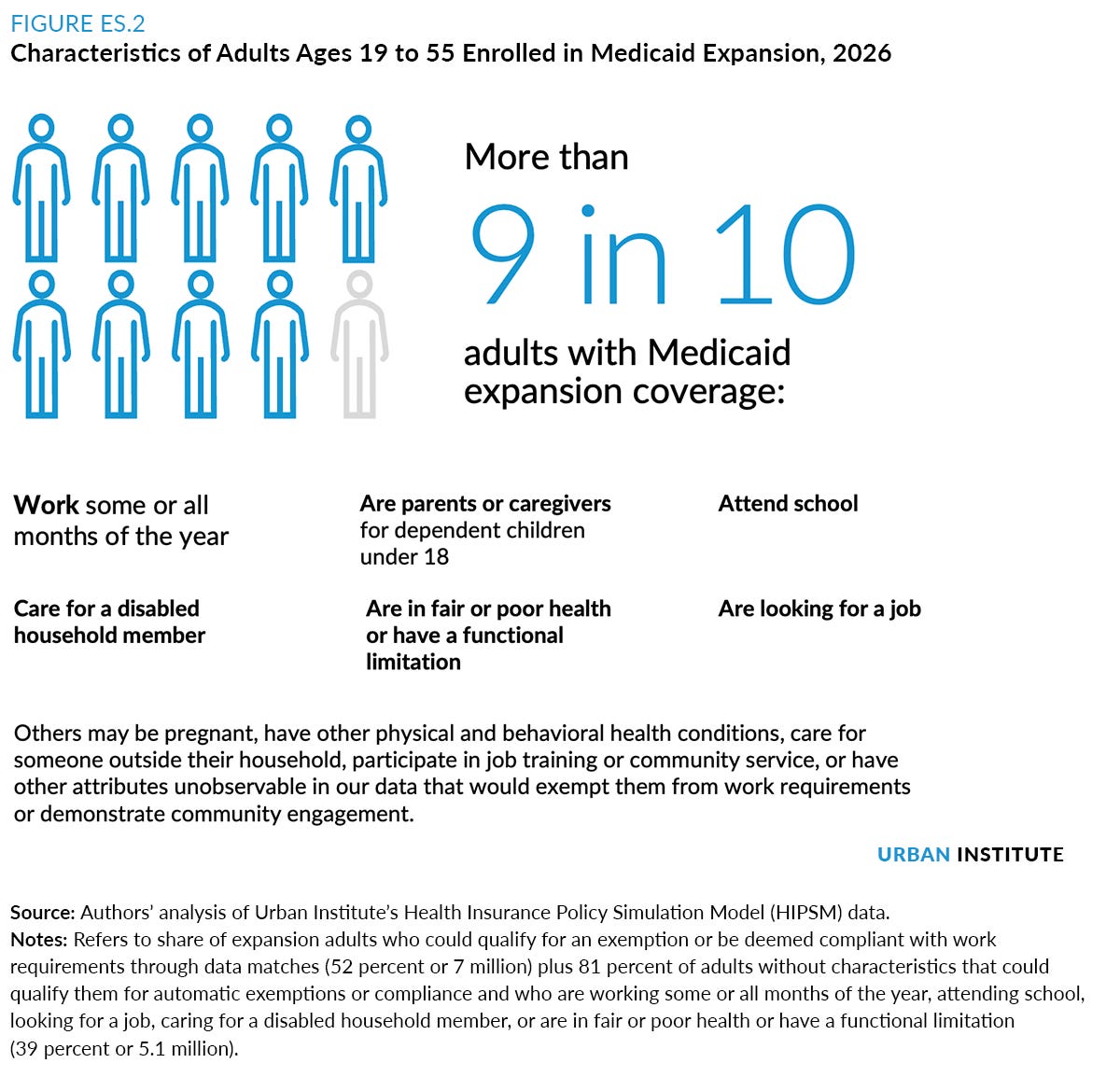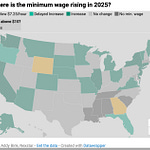Welcome to The Poverty Trap, a newsletter and podcast for people who are fed up with the inequality baked into America’s system and want to individually and collectively make change.

“In moments of candor, they [the founding fathers] acknowledged that it was simple avarice or greed to continue to exploit enslaved labor.” Jeffrey Rosen, president and CEO of the National Constitution Center, Philadelphia.
It seems everyone is up-in-arms about the Republicans’ current budget proposal that includes cuts to Medicaid, adds work requirements to get Medicaid, and slashes food benefits to our country’s neediest. And according to those working on the frontlines of healthcare, some elected officials and economic observers, we are worried for good reason:
— An excellent analysis of the proposed Medicaid cuts by the
newsletter, includes data from a preliminary Congressional Budget Office (CBO) memo outlining the bill’s potential impact on current Medicaid recipients: Between 2025-2034, approximately 8.6 million poor and working class Americans will lose their health insurance, and according to The Big Picture’s breakdown of the data, including some additional health care cuts, the number of newly uninsured could reach 13.7 million people by 2034.It’s important to emphasize that these cuts do not actually have to happen. This is a policy choice by Republicans to prioritize tax cuts for the wealthy over basic healthcare for the poor. The Big Picture, May 13, 2025
Here is a chart from The Urban Institute that breaks down the demographics of those currently receiving Medicaid. Although the vast majority are already working, this proposed bill requires an onerous work tracking system that will be difficult for recipients to complete and costly for states to administer.
— In a Washington Post opinion piece, columnist E. J. Dionne discusses the cruelty inherent in the proposed Medicaid cuts. It won’t just leave millions without health care, it will eliminate funding that supports the least powerful Americans, and areas of our country with the least resources: children and rural communities. Specifically, these drastic cuts to Medicaid and other health programs—nearly $715 billion over 9 years—will directly impact children’s hospitals and rural hospitals, doubtless leaving sickness and death in its wake, and turning underserved communities into health care deserts.
Stephen Teach, a pediatrician at the University of Vermont Medical Center who spent a quarter-century at Children’s National Hospital, told me that Medicaid cuts “could really challenge children’s hospitals’ very existence… “If Medicaid cuts were put into effect, you’d see attrition among rural medical practices that are already struggling,” he said. “It’s an existential moment for children’s hospitals and other hospitals dependent on Medicaid.” (The Washington Post, E.J. Dionne, Opinion Columnist. May 13, 2025).
— Meanwhile, back in the House of Representatives, Republicans are busy marking up the draft reconciliation bill to include even harsher cuts to Medicaid in order to bring its most conservative members to support it. But in the war of words that has ensued since the draft was proposed, Democrats, here Rep. Frank Pallone from New Jersey who is the ranking Democratic member of the House Energy and Commerce committee, attempted to clarify the true cost of the bill:
This is not trimming fat from around the edges, it’s cutting to the bone. The overwhelming majority of the savings in this bill will come from taking health care away from millions of Americans,” he [Rep. Frank Pallone, D.NJ ] added. “No where in the bill are they cutting ‘waste, fraud, and abuse’ — they’re cutting people’s health care and using that money to give tax breaks to billionaires.” NBC News, May 12, 2025 Read what else Rep. Pallone has to say about the proposed bill here.
— Journalists covering the economy and a Nobel prize-winning economist, for example, are also speaking out about the short and long-term impact of these drastic cuts to Medicaid. A Washington Post opinion columnist, Catherine Rampell, recently wrote an excellent piece analyzing the overall impact to the economy, factoring in the tariff upheaval and job cuts, and warning that cuts to the social safety net could deepen and prolong any coming recession:
Not only are these programs [Medicaid and food stamps] compassionate on an individual level, but they also help automatically stabilize the overall economy and pull it out of a downturn. That’s because mass hardship can become self-perpetuating, as laid-off workers cut back on spending and other economic activity, leading to even more layoffs. But safety-net programs swoop in and automatically boost sagging aggregate demand, effectively stimulating the economy and helping it recover faster.
—
—yes, he’s the Nobel Prize-winning economist I mentioned above—wrote a post just a few days ago on his Substack newsletter titled, “Attack of the Sadistic Zombies”, where in part, he compared the first Trump tax cut bill (the 2017 Tax Cuts and Jobs Act (TCJA) to the Republican’s current proposed bill:The TCJA, like the current legislation, gave big tax breaks to the wealthiest Americans. But it also threw a few crumbs to people further down the scale. By contrast, the House Reconciliation Bill, by slashing benefits — especially Medicaid — will cause immense, almost inconceivable hardship to the bottom 40 percent of Americans, especially the poorest fifth.”
_______________________________
“Almost inconceivable hardship…”. Sadly, this type of cruelty by elected officials is nothing new.
In the 1930’s and 1940”s, FDR attempted to include health care for all as part of the New Deal, but it was shunted aside. The “1935 Social Security Act created the old-age and unemployment insurance systems we have today, with no provisions for health care coverage.”
When Harry Truman assumed the presidency after Franklin Roosevelt’s death, he was a proponent of universal health care—an issue he understood well after his enlistment in the Army during WW I, where he saw many of the new, young recruits rejected because of poor health, which he attributed to the lack of basic health care.
In a draft message to Congress in 1947, Truman wrote: “Healthy citizens constitute our greatest natural resource, and prudence as well as justice demands that we husband that resource. … as a nation we should not reserve good health and long productive life for the well-to-do, only, but should strive to make good health equally available to all citizens.”
But the universal health care bill never got to a vote because of a vigorous campaign by the American Medical Association(AMA) and the first ever national PR campaign which dubbed the plan, “Socialized Medicine”. President Truman considered this loss the “greatest disappointment of his presidency”.
The AMA advocated for private insurance instead, and these plans became more accessible during the 1950’s and into the 1960’s. A health care social safety net was finally established in 1965 with President Johnson’s signing the Medicare and Medicaid Act. But let’s not forget today’s lonely, progressive voices that continue to fight for universal health care as a right, rather than as a for-profit industry.
______________________________________
Providing healthcare for all Americans, let alone slashing the budget to take away health care for our poorest, is a moral issue. But in good part, our country was founded on personal greed. Take our founding fathers and the viciousness of slavery, for the earliest example. I recently watched a fascinating interview with Jeffrey Rosen, president and CEO of the National Constitution Center. Rosen discusses the juxtaposition of the cruelty of permitting slavery with the inspiring ideals of virtue, equality for all men and a call for the “pursuit of happiness” for all Americans, each written into the Constitution. Rosen quotes Patrick Henry to make his point: “…It’s simple avarice: I cannot do with the inconvenience of not having slaves”.
Greed. Is that the reason behind slavery, that took a civil war to abolish? And is it “simple avarice” or greed that keeps our country from finally catching up with the rest of the industrialized world and enacting healthcare for all Americans as an “inalienable right”?
__________________________________________________________
I’d love to hear your thoughts on universal health care, the current push to slash Medicaid benefits, and whether the reluctance to divest oneself from slavery and greed, as evidenced in the writing of the founding fathers and the Constitution, might have something to do with today’s reluctance to help the poor. Please leave your ideas in the Comment Section below.













Share this post